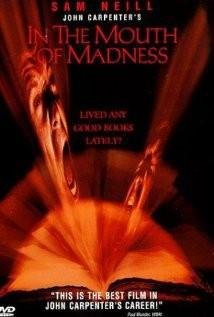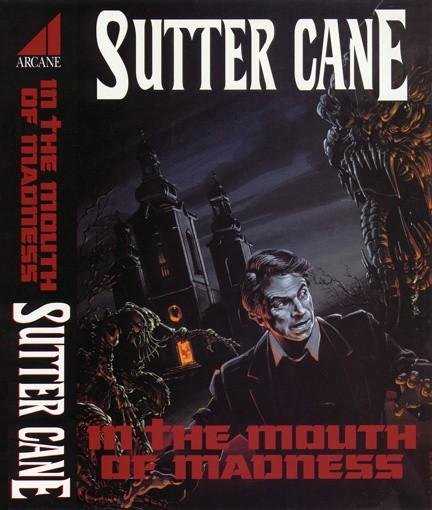Reality is not what it used to be...

In the Mouth of Madness is the story of John Trent, freelance insurance claims investigator, searching for missing author Sutter Cane. Cane is described as more popular than Stephen King, with his work noted as having a peculiar effect on his less stable readers. Trent tracks Cane to the fictional town of Hobbs’ End, where the author’s most recent work is becoming reality. Including Hobbs’ end itself, which only existed in Cane’s work and is now populated by his characters. Trent and Cane’s editor, Linda Styles, find that Cane himself has become an embodiment of the ancient horrors he writes about. With the powerful devotion of his followers, In the Mouth of Madness (Cane’s most recent novel) breaks the flimsy grasp humanity has on ‘reality’. Insane becomes the new Sane; if enough people believe, it’s becomes true. Trent becomes one of the last holdouts in vastly demented world.
Truth Time, Film Freaks: This is my favorite John Carpenter movie. In the Mouth of Madness is also among my favorite Lovecraftian works. Another Truth Bomb: I don’t love reading Lovecraft. However, I do love his ideas interpreted by others. If you don’t already hate my guts, I promise I’m through being blasphemous.
Madness is one of the horror films in the ‘Thinker’ category for me. You could view only what is being presented on screen and be fully satisfied. However, if you stop to think about what you’re being shown, it reaches a new level of terror. Carpenter explores two main themes that are worth a second thought. First, the fragility of reality and secondly, the origin of creative ideas.
Most of us take for granted the truly delicate nature of reality. If enough people wake up tomorrow believing pants are the Devil, prepare to be vilified if you step outside in jeans. Reality only functions because we all agree to it but even what we are agreeing on is in a constant flux. With that flux, comes ever changing qualifications of ‘sane’ vs. ‘insane’. Not so long ago, you could be indefinitely institutionalized for being promiscuous, mentally impaired or a homosexual. In the Mouth of Madness hands control of those definitions to a horror novelist. John Trent finds himself ‘sane’ by his standards and ours, but ‘insane’ because the world has changed in the blink of an eye.

It seems that at some point artist/writers/creators explore the idea of the power of creation. To this end, Stephen King gave us ‘Word Processor of the Gods’ and Wes Craven visits the idea in ‘New Nightmare’. Each examines the twin questions of: “What if my fiction becomes reality?” and “What role does belief play in making something become true?”. Ideas have power; In 2001, Takako Konishi died in Minnesota. According to some, she was searching for the buried money from ‘Fargo’. Occasionally, during this self examination, a more sinister thought occurs: “Where do ideas come from? What if they aren’t mine at all?” King asked himself this question in ‘The Dark Tower’. In Madness, Sutter Cane realizes too late that his ideas were not his own.
All in all, In the Mouth of Madness is a good time. It stands up to repeat viewings and time. The effects still look decent but the 90’s metal intro is a bit dated.
I’ll leave you with a question: Would you read Sutter Cane?

I could never hate your guts.
That's why I count myself lucky that we met ❤